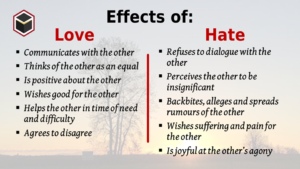By Yūsuf Badāt
One of the traits of the inhabitants in Paradise is that their hearts will be free of rancour and hate.
God Almighty says,
وَنَزَعْنَا مَا فِي صُدُورِهِم مِّنْ غِلٍّ
“We will have removed whatever is within their hearts of resentment [and hate].” (Qurʾān: 7:43)
May God enter us all in Paradise! (Āmīn)
Striving to have clean pure hearts, free from hate, rancour and resentment is an obligation. This is what has been taught by the Prophet of Islam (peace and blessings upon him) and practiced by his followers.
Zayd bin Aslam (may God’s mercy be with him) related that he visited the famous Companion, Abū Dujānah (may God be pleased with him) on his deathbed. He noticed that Abū Dujānah’s face was illuminating with joy at the odd time of nearness to death. Upon enquiry, Abū Dujānah explained, “I have two actions that I feel will be extremely weighty for me with God as I return to Him. I always refrained from speaking about matters that did not concern me. As for the other I kept my heart clean of hate for others.” (Al-Ṭabaqāt Al-Kubrā)
Unfortunately, hateful humans do exist. Global events such as the recent tragic Pittsburgh synagogue massacre, wherein elements of hate motivated an individual to shoot and kill 11 worshipers and injure 5, is an example. It is alleged that the synagogue was specifically targeted for their support to bring in refugees from Muslim countries. This act of hate, in reality, is not only antisemitism and islamophobia at its climax, rather an attack against the very spirit of human cooperation and coexistence, regardless of faith. This is the damage and carnage hate causes.
Sources of Hate and Its Effects
Imam Ibn Ḥajr Al-Haytamī (may God’s mercy be with him) says,
الْحَسَدُ مِنْ نَتَائِجِ الْحِقْدِ وَالْحِقْدُ مِنْ نَتَائِجِ الْغَضَبِ
“Jealousy is a result of hate and hate is the outcome of [unwarranted] rage [and anger].”
ذَكَرَ الْعُلَمَاءُ أَنَّ الْحِقْدَ مِنْ الْكَبَائِرِ
“Islamic jurists have listed hate as a major sin.”
When one is hateful, one ultimately begins to disengage with the one who one hates. Thereafter this escalates to perceiving the other as insignificant. The hater begins to backbite, allege and spread rumours. The hate than intensifies to causing pain, inconvenience and hurt. The hater is over joyed at the suffering of the other.
Responding to Hate
The great luminary, Imam Ghazālī (may God’s mercy be with him) explains that there are generally three ways people respond to hate.
أَحَدُهَا أَنْ يَسْتَوْفي حَقَّهُ الَّذِيْ يَسْتَحِقَّهُ مِنْ غَيْرِ زِيَادَةٍ أَوْ نُقْصَانٍ وَهُوَ الْعَدْلُ
The first [type of response to hate] is to seek out justice [from the hater] for a right, without indulging in any form of oppression. This is fairness.
الثَّانِيْ أَنْ يُحْسِنَ إِلَيْهِ بِالْعَفْوِ وَالصِّلَةِ وَذَلِكَ هُوَ الْفَضْلُ
The second [kind of response to hate] is to display kindness to the hater by forgiveness and upright dialogue. This is benevolence.
الثَّالِثُ أَنْ يُظْلِمَهُ بِمَا لَا يَسْتَحِقَّهُ وَذَلِكَ هُوَ الْجَوْرُ وَهُوَ اِخْتِيَارُ الْأَرَاذِلِ وَالثَّانِيْ هُوَ اِخْتِيَارُ الصِّدِّيْقِيْنَ وَالْأَوَّلُ هُوَ مُنْتَهَى دَرَجَاتُ الصَّالِحِيْنَ
The third [way some respond to hate] is to unjustly oppress and hurt the hater. This is injustice [and oppression] adopted by the lowly [and ignorant]. The second response [described above] is the choice of the elite righteous. The first response [listed above] is a general level of the good people.
How do we respond to hate?
Love is the best response to hate! The hater needs love! The hater requires proper behaviour to be displayed and modeled. If everyone hates, who will love?
Ridding Ourselves of Hate
Prayer
Constantly pray to God to rid and expel hate from our hearts as the Prophet (peace and blessings upon him) himself did. He prayed saying,
وَاسْلُلْ سَخِيْمَةَ قَلْبِيْ
(وَالسَّخِيْمَةُ هِيَ الْحِقْدُ فِيْ النَّفْسِ)
“[O God], extract [every element of] hatred from my heart!” (Abū Dāwūd)
Love Others, Even Those who Are Different
When the Prophet of Islam (peace and blessings upon him) was tortured and oppressed by his own people, he still loved them, established contact and dialogued with them. His temperament was always to detest the evil, not the evil doer.
He addressed the Makkans who opposed and tortured him, with the following words,
إِنَّ لَكُمْ رَحِماً عِنْدِيْ سَأَبُلُّهَا بِبَلَالِهَا
“You [Makkans] have a bond of kinship with me. I will continue to establish the love to the best of my ability.” (Saḥīḥ Muslim)
Detesting disbelief, immorality and evil is imperative. However, kindness and respect must be afforded to the one who may be entangled in disbelief and evil. Hate the sin not the sinner. The Qurʾān summons us,
أَنْ تَبَرُّوْهُمْ وَتُقْسِطُوْا إِلَيْهِمْ إِنَّ اللهَ يُحِبُّ الْمُقْسِطِيْنَ
“Be kind and just to the peaceful disbelievers, for indeed God loves the upright [and just]” (Qurʾān: 60:8)
Diversity is not a Reason to Hate
Every human has a right to live and enjoy the very liberties that we all cherish. As an example, just as we enjoy our private places of worship, the adherent of another religion has the right to worship at their temples or churches.
When the Prophet of Islam, Muḥammad (peace and blessings upon him) took control of Khaybar, he allowed the places of worship of other faiths to remain in-tact. Similar is the situation with countless Companions (may God be pleased with them) who conquered various lands.
The famous story of Caliph ʿOmar bin Khaṭṭāb (may God be pleased with him) is well known. When he was given a stately tour of the blessed city of Jerusalem by the Patriarch, Sophronius, they entered the Church of the Holy Sepulchre when the time for ʿOmar’s prayer had set in. Sophronius invited ʿOmar bin Khaṭṭāb to pray inside the Church but ʿOmar bin Khaṭṭāb declined. He insisted that if he prayed there, later Muslims would use it as an excuse to convert it into a mosque thereby depriving Christianity of one its holiest sites. Instead ʿOmar bin Khaṭṭāb prayed outside the Church, where a mosque was later built, in his name.
Diversity in religion, race, background, language and or origin is not a reason to hate, rather a basis to embrace and respect one another. God says,
يَا أَيُّهَا النَّاسُ إِنَّا خَلَقْنَاكُم مِّن ذَكَرٍ وَأُنثَىٰ وَجَعَلْنَاكُمْ شُعُوبًا وَقَبَائِلَ لِتَعَارَفُوا ۚ إِنَّ أَكْرَمَكُمْ عِندَ اللَّـهِ أَتْقَاكُمْ ۚ إِنَّ اللَّـهَ عَلِيمٌ خَبِيرٌ
“O mankind, indeed I have created you from a male and female and made you into diverse peoples and tribes that you may know one another. Indeed, the most noble of you in the sight of God is the most righteous of you. Indeed, God is All-Knowing and All-Acquainted.” (Qurʾān 49:13)
Lovers or Haters?
قِيْلَ يَا رَسُوْلَ اللهِ أَيُّ النَّاسِ أَفْضَلُ؟ قَالَ كُلُّ مَخْمُوْم الْقَلْبِ صَدُوْقُ اللِّسَانِ قِيْلَ صَدُوْقُ اللِّسَانِ نَعْرِفُهُ فَمَا مَخْمُوْمُ الْقَلْبِ؟ قَالَ هُوَ التَّقِيُّ النَّقِيُّ لَا إثْمَ فِيْهِ وَلَا بَغْيَ وَلَا غِلَّ وَلَا حَسَدَ
“The Messenger of God (peace and blessing upon him) was asked, “Which of the people are best?” He said, “Everyone who is pure of heart and honest in speech.” They said, “We know what is honest in speech. However, what is the pure of heart?” He replied, “It is [the heart] that is pious and pure, with no evil, injustice, hate or jealousy in it.’” (Ibn Mājah)
The famous poet and Islamic scholar, Imam Jalāl Al-Dīn Al-Rūmī (may God’s mercy be with him) articulated beautifully,
كُنْ فِيْ الْحُبِّ كَالشَّمْسِ
“Be like the sun, when you love [shining everywhere]!”
كُنْ فِيْ الصَّدَاقَةِ وَالْأُخُوَّةِ كَالنَّهْرِ
“Be like the flowing river in your friendship and bonds of kinship!”
كُنْ فِيْ سِتْرِ الْعُيُوْبِ كَاللَّيْلِ
“When it comes to the faults and flaws of others, be like the night [and its darkness].”
كُنْ فِيْ التَّوَاضُعِ كَالتُّرَابِ
“Be like the soil in humbleness [and humility].”
كُنْ فِيْ الْغَضَبِ كَالْمَيِّتِ
“Be like the dead when it comes to your anger.”
Conclusion
Islam teaches mercy and love. In love, there is nothing wrong in disagreeing with the views of others. Some practices and beliefs of others may seem different for us. However, we can never hate the other, regardless of the differences.
Recent increased efforts of interfaith in the communities have brought people of all faiths and no faith together. The ‘rings of peace’ formed by Muslims and Christians around several GTA synagogues in the aftermath of the Pittsburgh attack is a profound example.
Let us not let voices of hate and intimidation dismantle the harmony and understanding of majority peace and loving citizens. We are better when we love, not when we hate!





